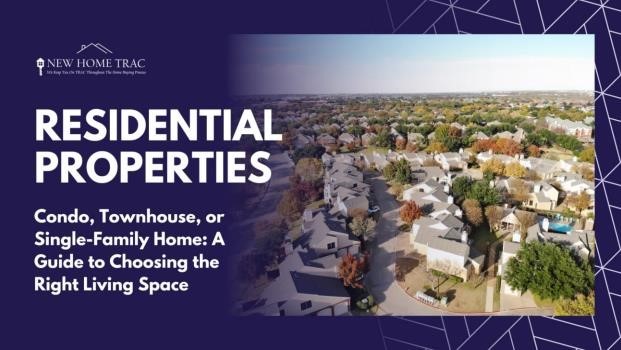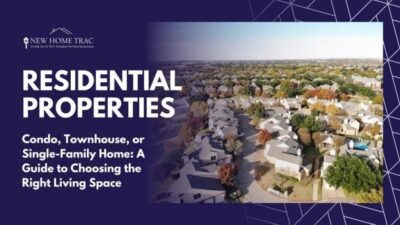When considering purchasing a home in Northern Virginia, one of the most important decisions you’ll make is determining the type of dwelling that best suits your lifestyle and preferences. Condominiums, townhouses, and single-family homes each offer unique advantages and disadvantages. This comprehensive guide will explore the key differences between these housing options and help you make an informed choice.
Understanding the differences
- Condominiums: Condos are privately owned units in a complex or complex. They often have common areas such as swimming pools, gyms and common areas. Owners pay a monthly association fee to cover maintenance and repair costs.
- Townhouses: Townhouses are multi-story buildings attached to one or more other buildings on both sides. They typically have private courtyards and balconies but share walls with neighboring buildings.
- Single-Family Homes: A single-family home has a separate yard and driveway. It offers the most privacy and flexibility of the three options.
Advantages and Disadvantages of Condominiums
Advantages:
- Lower maintenance: Condos typically require minimal exterior maintenance, as the association handles landscaping and building repairs.
- Amenities: Residents enjoy access to shared amenities like pools, gyms, and clubhouses.
- Security: Many condo complexes offer features like gated entrances and on-site security personnel.
- Location: Condos are often conveniently located with easy access to transportation and amenities.
Disadvantages
- Association fees: Owners must pay monthly association fees, which can add to the overall cost of ownership.
- Limited privacy: Condos can be less private than single-family homes, as neighbors may be closer and noise can be more noticeable.
- Restrictions: Condo associations often have rules and regulations governing pet ownership, renovations, and other aspects of living in the community.
Advantages and Disadvantages of Townhouses

Advantages:
- Privacy: Townhouses offer more privacy than condos, with private entrances and yards.
- Lower maintenance: While townhouses require more maintenance than condos, they still have less exterior upkeep than single-family homes.
- Affordability: Townhouses are often more affordable than single-family homes in the same area.
- Amenities: Some townhouse communities offer shared amenities like pools and playgrounds.
Disadvantages:
- Shared walls: Townhouses share walls with neighboring units, which can lead to noise issues and potential conflicts.
- Limited yard space: Townhouse yards are typically smaller than those of single-family homes.
- Association fees: Many townhouse communities have association fees to cover maintenance and upkeep costs.
Advantages and Disadvantages of Single-Family Homes
Here are the advantages and disadvantages of Single-Family Home in Northern Virginia Advantages:
- Privacy: Single-family homes offer the most privacy of all three housing options.
- Flexibility: Owners have complete control over their property, including renovations, landscaping, and pet ownership.
- Appreciation: Single-family homes often appreciate more quickly than condos or townhouses.
- Resale value: Single-family homes typically have higher resale values.
Disadvantages:
- Higher costs: Single-family homes are generally more expensive to purchase and maintain than condos or townhouses.
- Maintenance: Owners are responsible for all exterior maintenance, including landscaping, roof repairs, and exterior painting.
- Taxes: Property taxes on single-family homes are often higher than on condos or townhouses.
Factors to Consider When Choosing a Housing Type
The following factors should be considered when deciding on a condominium, townhouse, or single-family home.
- Lifestyle: Consider your lifestyle and preferences. Do you enjoy socializing with your neighbors? Do you need more privacy? How necessary are amenities like a pool or gym?
- Budget: Establish your budget and consider ongoing expenses for each room, including rent, property taxes, insurance and association fees.
- Location: Consider the location of each building type. Do you want to be closer to downtown or more suburban?
Future Plans: Think about your plans. Are you planning to start a family? Do you look forward to working from home? These factors can influence the type of room you choose.
Additional Tips for Home Buyers

- Work with a qualified real estate agent: A real estate agent in Northern Virginia can help you navigate the home-buying process and find the right property for your needs.
- Do your research: Research different neighborhoods and communities to find one that suits your lifestyle and preferences.
- Consider the resale value: If you plan to sell your home in the future, consider the resale value of different housing types.
- Negotiate: Don’t be afraid to negotiate the price and terms of your purchase.
Consider Alternative Options
As an alternative, many home buyers are turning to Total Property Buying Solution companies such as New Home TRAC (newhometrac.com). New Home TRAC is revolutionizing the home-buying arena by offering potential new home buyers a professional concierge who manages every aspect of the process. Gone are the days when you must look for your own Realtor, Lender, Title Company, Moving Company, Storage Company (if needed), and much more. They offer a proper turnkey solution that takes you from the dream of homeownership to the reality of being in your ideal property without dealing with all the hassle and stress generally associated with purchasing a home.
By carefully considering these factors and following these tips, you can make an informed decision about the best housing type for you and your family in Northern Virginia.
Remember, it’s essential to partner with a local team of experts who can handle all aspects of Real Estate buying/selling. They must provide invaluable support and expertise throughout the home-buying process. Why not let the highly skilled professionals at New Home TRAC be your guide to explore specific neighborhoods or property types in more detail? You can find them at: newhometrac.com or Tel: (855) 8-NEW HOME / (855) 863-9466.







